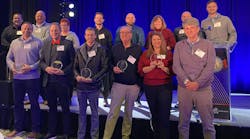Independent manufacturers' reps see the value of becoming certified as professional reps.
A friend recently told me about Lyman Kittredge, a professor at Harvard, who was generally considered one of the world's great authorities on Shakespeare, although he lacked a doctorate. When asked about this missing credential, Kittredge's stock response was, "Who on earth would examine me?"
The presence or absence of a credential is a major issue in some fields of endeavor, a total non-issue in others, and a phenomenon on the rise in still others. For example, you may need an E.E. degree to get a meaningful engineering job in the electrical industry, and you're likely to need a license to function as a contractor. You can't practice law or medicine without the requisite credentials; and you can go only so far as an accountant without earning the right to use the initials C.P.A. after your name.
As we saw with Professor Kittredge, you can achieve high rank as a college teacher without the traditional union card, but you are not well-advised to pursue a career in academia without it. Whether you are in a field whose culture sets requirements, one subject to government licensing demands, or one where corporations have formal or informal standards such as the B.S.E.E. or even the M.S.E.E., the ticket of admission is all-important.
Perhaps the easiest of all fields to enter (although by no means the easiest to succeed in) is sales. There are no preordained educational qualifications, relatively few restrictions or regulations, and no enforcing bodies as long as the salesperson's activities remain legal. Yet, with nobody demanding to see our licenses, the generally acknowledged leaders of the sales profession-the heads of independent professional field sales organizations- have created another bar to jump over: certification. And having convinced ourselves that certification is a good thing for us and for the people we do business with, we now face a really tough sales job-making people care!
Why should the electrical purchasing and distribution community care about certification for manufacturers' representatives? To begin to understand, one needs to step back about 15 years, when a group of manufacturers' representatives in the National Electrical Manufacturers Representatives Association (NEMRA), joined colleagues in the electronics industry to organize and fund the Manufacturers Representatives Educational Research Foundation (MRERF), now located in Geneva, Ill. Its charter was to enhance the professionalism of manufacturers' representatives and to enhance appreciation in commerce, industry and academia for the economic value that reps create.
In time, reps from other industries, through their associations, joined in sponsoring MRERF, and in establishing its Institute for Professional Advancement. Today 29 associations have joined NEMRA in sponsoring MRERF. The 15,000 aggregate members sell billions of dollars worth of goods annually in everything from ballasts and lighting to groceries and mops.
A number like that deserves respect, yet MRERF itself, as well as its certification program, emerged in part from the "I don't get no respect" Rodney Dangerfield syndrome. Research confirmed what anecdotal evidence indicated, that neither manufacturers nor commercial and industrial customers really understood the phenomenon of the entrepreneurial, multi-product independent sales organization. Moreover, even practitioners did not fully recognize what they needed to know, not so much to sell their products as to run their companies. That's what the certification pioneers decided their program should be all about. Thus, the first step was to establish standards to define what the manager of a professional sales organization needs to know.
Accordingly, they developed a three- year educational program, including an annual on-campus component, with rigorous course work and written examinations leading to the award of the CPMR (Certified Professional Manufacturers' Representative).
One of the key early decisions made by the developers of the reps' certification program was that nobody, regardless of his or her knowledge base or experience, would be "grandfathered" or allowed to use the CPMR designation without fulfilling the explicit requirements. Uniformity of expectations was inherent in the desired result, and therefore it had to be built into the process. Another key was that, regardless of the fringe benefit of elevating respect for the manufacturers' representative function, the major benefit the certified rep would derive would be in becoming a more knowledgeable and effective executive and trainer, as well as salesperson. Effective salespeople are inherently competitive, and certification would provide the satisfaction of leadership, setting and meeting standards that others could only seek to emulate.
As one of the 700 independent manufacturers' reps to have become certified, Kevin McDonald, CPMR, the principal of McDonald Associates, Inc., Arlington Heights, Ill., finds the certification proves to customers that he knows how to run his own business and to train his staff, and that he has made a serious commitment to his territory and his industry, as well as to the factories he represents and the customers he calls on.
Of course, to be able to deliver these messages, McDonald must be sure that the person he's calling on knows that he is a CPMR. "Our market penetration isn't great enough yet to have made CPMR a household word," he says. "But when I hand someone my business card and the letters stare him or her in the face, the question is almost always forthcoming, along with the opportunity for the explanation."
McDonald says that he also usually takes the opportunity to talk, not only about the certification advantage, but also about the rep advantage. "I remind my customer that his or her time is being used in an especially productive way because the sales call will cover a group of related products, and because I've been trained to use my customers' time efficiently."
Manufacturers benefit, too, says Gary Lessing, principal of Ewing-Foley, Inc., Cupertino, Calif.
"In the real world, we're a long way from the day when a sales manager will insist that a rep be certified before he's given the territory, he says. "But when I'm competing for a new line, I merchandise the blazes out of the commitment that my CPMR status demonstrates toward running a total quality rep firm.
"Traditional measurements in the rep business-sales, commissions, share of market-are controlled in some measure by external factors. But proving to yourself that you're the best you can be...nobody can take that away from you."








